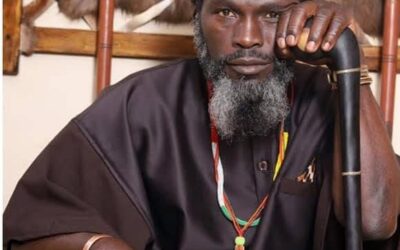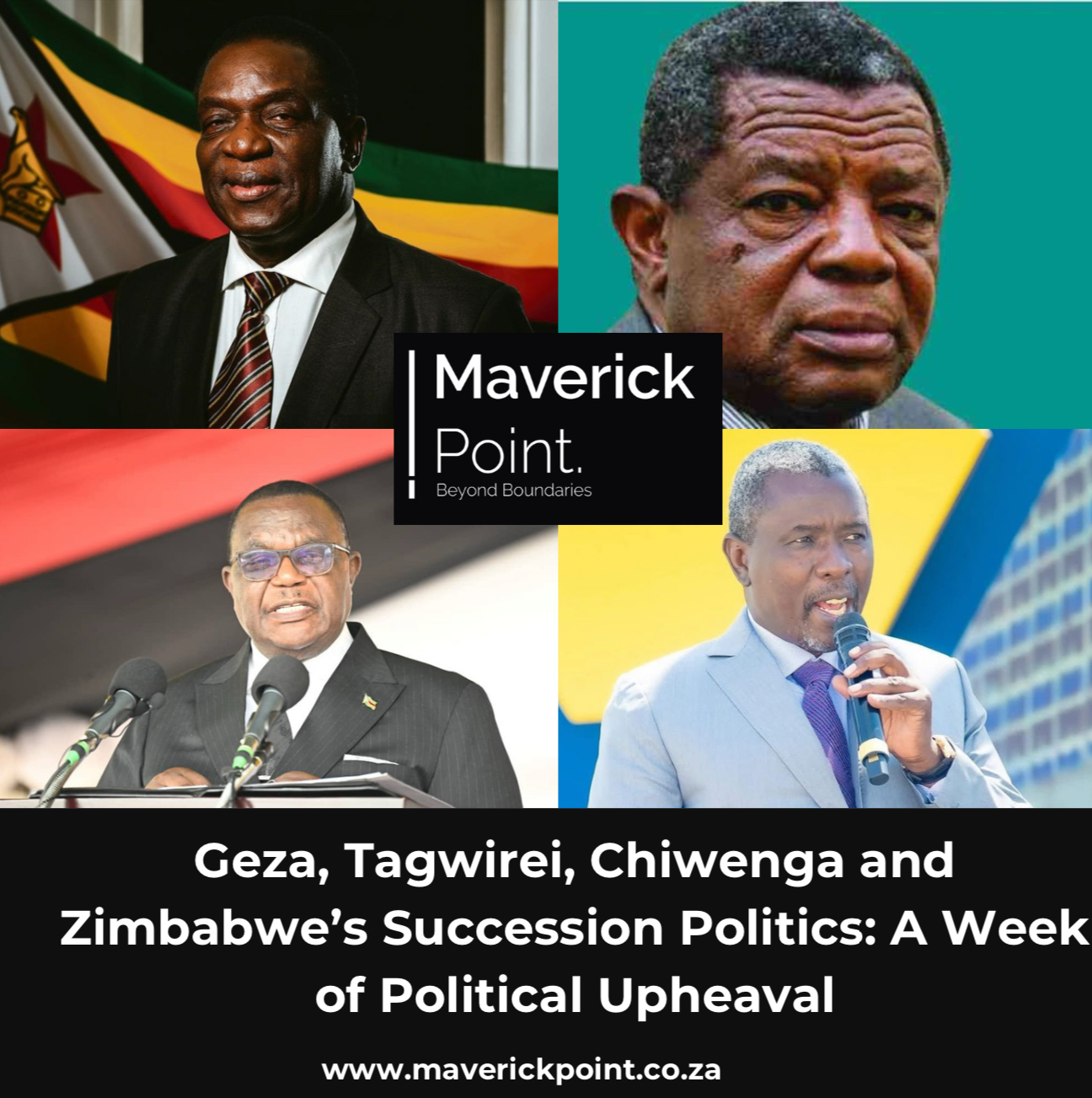By Bafana Phalane
Zimbabwe witnessed yet another politically charged week, beginning with war veteran Blessed Geza’s grandstanding against President Emmerson Mnangagwa and the ruling ZANU-PF party. What was initially meant to be a large-scale national protest calling for Mnangagwa’s resignation turned into a de facto shutdown, as Zimbabweans opted to stay indoors rather than face potential clashes with security forces. Despite the low turnout, the protest sparked significant discussions on the future of Zimbabwe’s leadership, with Geza pushing for Vice-President Constantine Chiwenga to take over while also singling out influential businessman Kudakwashe Tagwirei in his latest attacks.
The March 31 protest, spearheaded by a faction of disgruntled war veterans, was widely anticipated as a moment of reckoning for the Mnangagwa administration. However, in a country with a history of heavy-handed crackdowns on dissent, few citizens were willing to risk their lives in the streets. The government deployed police and military units in anticipation of large demonstrations, creating an atmosphere of fear that effectively neutralized any significant public uprising. While only a handful of protesters gathered, they were quickly dispersed by law enforcement using tear gas, reinforcing the government’s tight grip on political opposition.
Geza, undeterred by the low turnout, took to X (formerly Twitter) to chastise Zimbabweans, accusing them of cowardice and inaction. His disappointment, however, did not deter his broader agenda, as he pivoted his efforts toward an alternative strategy—an attempt to impeach Mnangagwa on claims of mental incapacity.
Geza’s calls for impeachment echo previous allegations made by exiled former cabinet minister Saviour Kasukuwere, who claimed Mnangagwa was no longer fit to govern. Geza doubled down on this assertion, stating that a group of lawmakers was ready to table the motion in Parliament. However, impeachment remains a long shot in Zimbabwe’s political landscape, where Mnangagwa’s grip on the ruling ZANU-PF remains firm. The party, known for closing ranks against external pressure, is unlikely to entertain an impeachment motion against its own leader, especially from a factional war veteran with limited institutional backing.
The impeachment push appears less about legal viability and more about creating a public perception of instability within the Mnangagwa camp. By continually raising these claims, Geza is seeking to rally opposition and shake the confidence of the ruling elite. However, his focus on Vice-President Chiwenga as the preferred successor raises critical questions about the true motivations behind his political crusade.
While Geza has been relentless in his criticism of Mnangagwa, he has curiously spared other key ZANU-PF figures, particularly Chiwenga. This raises concerns that his campaign is less about national interests and more about factional politics within ZANU-PF.
Chiwenga, the former army general who played a pivotal role in the 2017 coup that ousted Robert Mugabe, has long been rumoured to harbour presidential ambitions. His tense relationship with Mnangagwa has fuelled speculation that a power struggle is brewing within the party. By positioning Chiwenga as a viable alternative, Geza appears to be siding with a faction that sees Mnangagwa as an obstacle to their own political aspirations.
However, if the fight is truly about corruption and governance failures, then why is Geza not calling for a complete overhaul of the system? Chiwenga himself has been accused of involvement in illicit deals, yet Geza remains silent on the vice president’s track record. This inconsistency suggests that Geza’s agenda is not purely about democratic reform but rather about shifting power within the same ruling elite.
Amid his attacks on Mnangagwa, Geza has also directed significant attention toward Kudakwashe Tagwirei, a billionaire businessman and influential figure within ZANU-PF circles. Geza has accused Tagwirei of working against Zimbabwe’s land reform program by allegedly using banks under his control to seize land from struggling farmers.
Tagwirei, known for his vast business empire and close ties to the ruling party, has been a controversial figure for years. His control over key economic sectors, particularly in fuel and mining, has led to allegations of state capture. However, he has dismissed Geza’s allegations, arguing that his financial institutions are merely offering bankable title deeds to help farmers secure funding for agricultural development.
This attack on Tagwirei is intriguing because it aligns with Mnangagwa’s perceived economic policies rather than a broader critique of ZANU-PF’s governance failures. If Geza were genuinely concerned about corruption, why is he not also targeting other oligarchs within the system? Why the singular focus on Tagwirei?
One possible explanation is that Tagwirei represents a power bloc within ZANU-PF that stands in the way of the faction Geza supports. Tagwirei’s influence extends into political circles, and if he were to shift allegiance, it could disrupt the balance of power within the ruling elite. By attacking him, Geza may be attempting to weaken Mnangagwa’s support network, thereby making it easier for Chiwenga to consolidate power.
While Geza’s campaign against Mnangagwa is clear, it is less certain whether Tagwirei has political ambitions of his own. Historically, Zimbabwe’s politics have been dominated by military and party elites rather than business tycoons. However, as seen in other African nations, the line between business and politics is often blurred.
If Tagwirei were to make a move into formal politics, he would face resistance from both the ruling party and the opposition. His vast wealth could serve as both an asset and a liability—providing resources for a potential campaign but also making him an easy target for accusations of economic exploitation.
For now, it seems more likely that Tagwirei will continue to operate behind the scenes, leveraging his financial influence to shape Zimbabwe’s political future rather than seeking office himself. However, his name being mentioned in succession debates suggests that he is already a significant player in the power struggles ahead.
Ultimately, Geza’s crusade and the political drama surrounding Mnangagwa, Chiwenga, and Tagwirei highlight the ongoing challenges Zimbabwe faces in achieving genuine political change. If the fight against corruption and dictatorship is to be credible, it cannot be selective.
For the ordinary Zimbabwean, the key question remains: Is this a fight for democracy or just another battle among the ruling elite? If Geza’s goal is to replace one faction of ZANU-PF with another, then the country risks repeating the same cycle of power struggles without real reform.
As Zimbabweans watch these events unfold, they must remain vigilant and ensure that their voices are not used as pawns in a power game. True change will require more than just removing Mnangagwa—it will require dismantling the entire system of elite-driven governance that has kept Zimbabwe in a state of political and economic stagnation for decades.
The coming months will reveal whether Geza’s movement has the staying power to truly challenge the status quo or if it is merely another chapter in Zimbabwe’s long history of political maneuvering.
Bafana Phalane: Authour & Founder @ Maverick Point








13 thoughts on “Geza, Tagwirei, Chiwenga, and Zimbabwe’s Succession Politics: A Week of Political Upheaval”